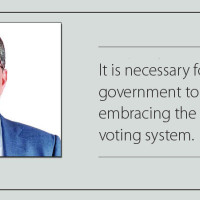- Wednesday, 11 February 2026
Judicial Credibility At Stake
Judiciary is bleeding white in Nepal. It has been more or less reduced into a constitutional entity shorn of needed legitimacy and trust in it. In the history of the administration of justice, judiciary had not faced the crisis of identity and legitimacy of the scale and proportion that it has confronted during the contemporary times. The incumbent Chief Justice Cholendra Shumsher Rana is indicted, and the motion of impeachment has been registered against him at the parliament which has been lying pending for several months now. The parliament's immobilism has deadlocked the impeachment proceeding. The motion has been, in fact, allowed to remain inconclusive without assignment of any reasons.
Chief Justice Rana has been accused of abetting to corrupt practices and unscrupulous acts for long entrenched in judiciary. This has maligned the image and prestige of judiciary. Not only the bar and even his fellow judges have deserted him and boycotted his judicial leadership – an unusual event in the annals of judiciary of a democratic country. However, one needs to admit the fact that it is not the judges dispensing justice in the court of law alone but the lawyers and law practitioners are also blamed for the decline of the image of judiciary and miscarriage of justice.
Distortion of justice
Lawyers as collaborators aiding and assisting the process of justice dispensation are often alleged of managing convivial nexus with judges to broker unfair deals to engender a distortion of justice. It is also charged that lawyers strike shady deals with judges, operate as intermediaries and thus deal sickening blow to the standards and values of justice as if it was a commodity to be bought and sold in the market. The disclosure that a well-known lawyer active in the Nepal Bar Association made an offer of bribe to a district court judge soliciting for a decision favouring his client who is behind the bar for embezzling resources and breaching the trust has come into public scrutiny. The fact that the lawyers are also indulged as intermediaries, among others, has been indicated in the reports of the panel headed by Supreme Court (SC) justices to constitute to reform the judicial system. The disclosure has confirmed the veracity of the fact.
Despite the constant deterioration in the performance of judiciary during these days, it must be noted that the Nepali judiciary has a glorified precedence in Nepal. It has held aloft banner of justice high even during the time when the country’s polity was allegedly authoritarian and the constitution itself was less supportive of and friendly to judicial independence. Even during the time of party-less polity, the court had awarded landmark judgments.
The SC’s verdict on the defamation case Sarbgya Ratna Tuladhar vs Rastriya Panchayat (national legislature during the party-less Panchayat era) can be described as an important judicial verdict. The verdict delivered by a five-member full bench interpreted the Rastriya Panchayat as a body whose lawmaking authority was not absolute but subject to judicial review. This had helped in providing succor to the concept of judicial competence and independence in Nepal.
Moreover, later during the multiparty era too, the apex court made an important contribution in restoring constitutional democratic order in the country through judicial recourse. When King Gyanendra took the executive power from the elected Prime Minister and formed a Cabinet under his chairmanship, he neither followed the due process nor acted according to the constitutional propriety. A royal commission was constituted in the name of inquiring into corrupt practices and abuses of authority by the members of the governments, but, in fact, that was motivated by political vendetta. Consequently, the then Prime Minister Sher Bahadur Deuba who currently holds the incumbency of the post too and many other senior leaders had been imprisoned. The repercussions of royal takeover were several.
The very limits of constitutional monarchy were superseded. Parliament was already dissolved and civic freedoms were jeopardised. With a view to checking the abuse of authority, political leaders submitted petition before the SC against the functioning of the royal commission. The court had a historic moment to accord its highest esteem and respect to the supremacy of the constitution and restrain any move going against the principle of the constitution. In its historic judgment, the court emphasised that that the sovereignty of the country resided in the Nepali people, and hence they were the only source of the state power.
Since there already existed a constitutional body — Commission for Investigation of the Abuse of Authority (CIAA) -- to investigate into corruption and the abuse of authority, the establishment of the royal commission was not warranted and justified. The judgment had thus rejected all the premises of the royal takeover. The judicial decision was in deed a prelude to the road to the republican democratic order in Nepal. However, as highlighted at the outset too, respect and esteem that the judiciary commanded has now been significantly denuded.
Reforms in need
Needless to say, a well-functioning justice system is crucial to address the issues of rule of law, constitutionalism, accountability and transparency effectively. But corruption and perceptions of corruption in the judiciary has undermined the courts’ credibility in Nepal. Moreover, it has also harmed all the core judicial functions, such as dispute resolution, law enforcement, protection of property rights and contract enforcement. In addition, it has also impaired the broader accountability function that the judiciary is entrusted with in democratic systems – upholding citizens’ rights, securing the integrity of the political rules of the game, and sanctioning representatives of executive and legislative branches when they act in contravention of the law. It has become very urgent to restore the trust and credibility of the judiciary in the country for which necessary reforms both in the composition of the Judicial Council and the appointment process of justices are needed.
(The author is presently associated with Policy Research Institute (PRI) as a senior research fellow. rijalmukti@gmail.com)
















